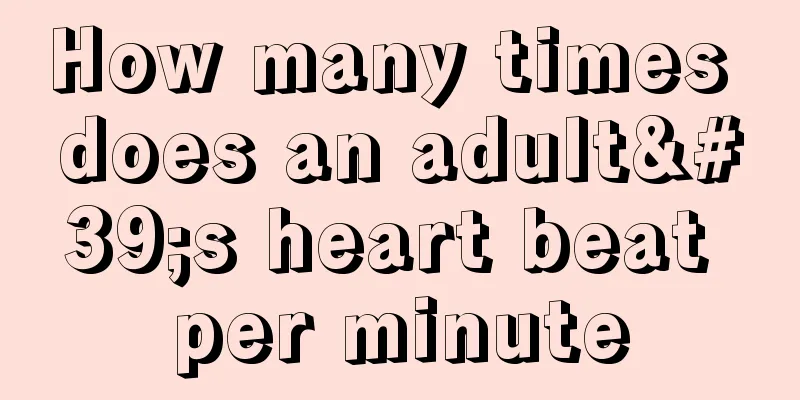How many times does an adult's heart beat per minute

|
The human heart is equivalent to the source of power for the body. If there is an abnormality in the heartbeat, it needs to be taken seriously. Generally, it is due to abnormalities in physical health. However, with age, the heartbeat time of the human body will gradually slow down. Generally, children's heartbeat is faster. However, these are all normal phenomena, and you don't need to worry too much in normal times. How many times does an adult's heart beat per minute? The normal heart rate for adults is 60-100 beats/minute, and the ideal heart rate should be 55-70 beats/minute (the heart rate of athletes is slower than that of ordinary adults, generally around 50 beats/minute). Factors associated with abnormal changes Heart rate changes are closely related to heart disease. If the heart rate exceeds 160 beats/minute, or is lower than 40 beats/minute, it is mostly seen in patients with heart disease. If it is often accompanied by palpitations, chest tightness and other discomforts, a detailed examination should be carried out as soon as possible so that treatment can be targeted at the cause. 1. Tachycardia When an adult's heart rate exceeds 100 beats/minute (generally not more than 160 beats/minute) at rest, it is called sinus tachycardia, which is common in people who are excited, agitated, smoke, drink alcohol, drink strong tea or coffee, or in pathological conditions such as infection, fever, shock, anemia, hypoxia, hyperthyroidism, heart failure, or after the use of drugs such as atropine, epinephrine, ephedrine, etc. 2. Bradycardia When an adult's heart rate is lower than 60 beats/minute (generally above 45 beats/minute) at rest, it is called sinus bradycardia, which can be seen in healthy people and athletes who engage in heavy physical labor for a long time; or in hypothyroidism, increased intracranial pressure, obstructive jaundice, and overdose of digitalis, quinidine or propranolol. If the heart rate is lower than 40 beats/minute, sick sinus syndrome, atrioventricular block, etc. should be considered. If the pulse is unequal and irregular and the pulse rate is less than the heart rate, atrial fibrillation should be considered. 3. Correctly view sinus bradycardia Many people experience sinus bradycardia with irregular heartbeats, which is normal for most people and there is no need to worry too much. Sinus bradycardia refers to a person with a heart rate of less than 60 beats per minute. Whether this symptom will occur depends on the frequency of the bradycardia and the cause of the bradycardia. When in a resting state, an adult's heart rate will generally not show obvious symptoms if it is between 50 and 60 beats per minute. Especially some well-trained athletes and people who engage in physical labor for a long time will not show obvious symptoms even if their heart rate is around 40 beats/minute in a quiet state. However, if the average person's heart rate is between 40 and 50 beats per minute, they will experience symptoms such as chest tightness, fatigue, and dizziness. If the heart rate drops to 35 to 40 beats per minute, hemodynamic changes will occur, affecting the blood supply to the heart and brain, resulting in chest pain, dizziness, syncope, and even sudden death. If you do not feel any discomfort, you do not need to pay attention to the "sinus bradycardia with irregularity" mentioned in the electrocardiogram. However, if you experience symptoms such as chest tightness, fatigue, dizziness, etc., you should go to the hospital immediately for further examination, such as dynamic electrocardiogram, cardiac color ultrasound, etc., to understand the cause of bradycardia. If the heartbeat is too slow, a pacemaker can be installed to relieve the symptoms and improve the prognosis. Daily care methods 1. Exercise Regular participation in various exercises of appropriate intensity will slow down your resting heart rate. Although the heart rate increases during exercise, exercise can exercise the heart function and thus slow down the resting heart rate. The generally appropriate exercise heart rate is "170-age". For example, for a 50-year-old person, the exercise heart rate should be controlled at 120 beats/minute. A heart rate that is too fast means that the amount of exercise is too much, which will not achieve the desired effect. You should feel comfortable and not tired before exercising. Generally, exercise should not exceed 1 hour, and the best time each time is 30 minutes to 60 minutes. Exercise at least 3 times a week. 2. Correct bad lifestyle Staying up late, smoking and drinking can all increase your resting heart rate. Drink less strong tea, especially not before going to bed, otherwise it can easily lead to insomnia. You should also have regular bowel movements to keep bowel movements smooth. 3. Maintain a proper weight Obesity will increase the burden on the heart and increase the heart rate, so obese people should maintain a suitable weight through fitness exercises and adjusting their diet. 4. Keep a calm mind In life, you should keep a calm mind and don’t always be anxious or angry. If your heart rate is too fast due to tension, anger, etc., you can gradually calm down by listening to music, meditating, etc. 5. Medication Certain diseases such as hypertension and coronary heart disease can cause an accelerated heart rate, and you can take medication according to the doctor's advice to slow down the heart rate, protect the heart, reduce and control myocardial ischemia events, improve heart function, and prolong life. |
<<: Is it easy to extract lower wisdom teeth?
>>: What is the normal heart rate when running
Recommend
Symptoms of peach hair allergy
The weather is getting warmer day by day, and the...
What is the cause of upper limb pain
If you sit in one position for too long, you will...
The inheritance of favism
Favism is a highly heritable disease that is high...
Can I eat mung beans and red beans if I have high uric acid?
High uric acid often causes gout, mainly due to t...
Is digestive ulcer disease serious?
Gastrointestinal ulcers are actually a serious di...
What should I do if my left shoulder clavicle is dislocated?
The impact of heavy objects or sudden falls, incl...
Is it harmful to eat cucumbers with flowers?
Cucumber is a common vegetable in life. People wh...
How to treat pancreatic cancer after metastasis?
Pancreatic cancer is one of the common malignant ...
What to do if gums shrink and turn black? Prevention is important
Poor daily dental hygiene and bad dental habits c...
Early manifestations of uterine cancer at the age of 12
Early symptoms of uterine cancer at the age of 12...
What are the treatment methods for confirmed liver cancer? How to treat advanced liver cancer with ascites?
What are the treatments for liver cancer? The cur...
What are the benefits of drinking red wine at night
Many people have a habit of drinking at night, th...
What is the reason for the pain in the lower abdomen and anus?
Sometimes our bodies may feel uncomfortable, and ...
How are melanoma nodules treated?
Melanoma usually occurs in the elderly, around th...
What to do if there is rot between toes
In life, many people have experienced ulcers betw...









